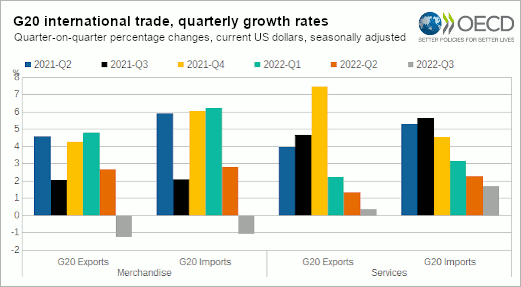
The Organization for Economic Cooperation and Development (OECD) disclosed that in the third quarter of 2022, for the first time in two years, trade in G20 nations fell in terms of value compared to the quarter previous. In particular, measured in current US dollars, exports and imports fell by -1.3% percent and -1.1% percent respectively, the OECD said, as global demand began to slow down and the largest economy was more likely to be part of the commodity prices has fallen from the highs. Specifically, the decline in oil prices has weakened exports of goods in North America, with the United States and Mexico experiencing positive but slower growth than in previous quarters. In the European Union, exports and imports of goods contracted by -1.5% percent and -0.7% percent respectively. In the United Kingdom, exports grew by 0.8% percent, while imports fell sharply by -9.9% percent. Freight traffic has remained weak in East Asia, despite the increase in sales of electronics and machinery. Exports declined by -0.3% percent in Japan and -1.0% percent in Korea, but increased by 0.7% percent in China. After several quarters of sustained growth, major commodity traders in G20 saw a decline in exports of goods, partly reflecting the cooling demand and falling prices.
"It is too early to draw any concrete conclusions," said Paul Schreyer, head of the OECD's statistics bureau, but this latest development in G20 goods trade warrants further monitoring as the global economy needs to address multiple headwinds, including tightening monetary policies, falling commodity prices, and weakening demand. "
The OECD said that in the third quarter of 2022, the value of the G20 services trade, measured in US dollars, also had a further current slowdown : the growth of exports was estimated to have flattened to 0.3% percent and the imports grew by 1.7% percent. This compares with higher rates recorded in the second quarter of 2022 (+ 1.3% and 2.3% respectively). The OECD has specified that the slowdown has contributed to the decline in shipping costs that in many G20 economies weighed on the value of transport services. 
